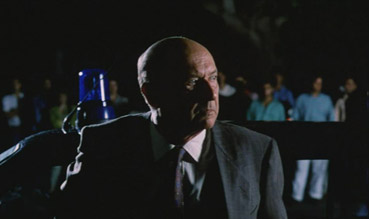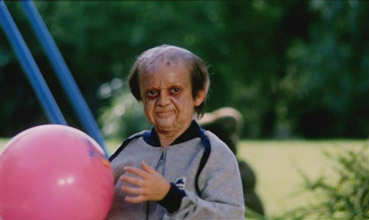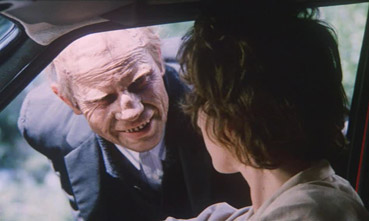|
There's
a real danger that gore hounds will approach Phantom
of Death (Un Delitto poco commune,
aka Off Balance) with expectations of content
that the film was ever destined to meet.
One of the first titles put out on DVD by new horror label Shameless,
released alongside the notoriously violent New
York Ripper, it was directed by Ruggero Deodato,
the man responsible for that prince of video nasties, Cannibal
Holocaust. Phantom of Death has
its gory moments, including an early smash-through-glass
murder that has giallo splattered all over it, but it later
reveals itself to be an altogether different beast. And
a rather good one.
Heading
up the characters is handsome 30-something concert pianist
Robert Dominici, and as we listen to him hammering the ivories,
a woman is violently murdered by an unseen assailant. Is
there a connection? Could be. Following his concert, centre-of-attraction
Robert floats around a garden party until grabbed by Susanna, a girl he's been casually dating who now wants
to get serious. But the idea of marriage and kids
doesn't appeal much to our Robert. He has a thing for the
ladies nonetheless, and a short while later is being chatted
up by the beautiful Helene, something he doesn't try all that hard to resist.

Also
at the party is the cheerless inspector Datti and his breezy
daughter Gloria. Datti missed the concert because he was
investigating the murder and has nothing to
go on but vague witness description of a 30-year-old man
seen leaving the scene. Susanna, meanwhile, is busy getting
over her disappointment at Robert by sleeping with his best
friend David. All this has taught her is that she'd rather
be with Robert, so she hops out of bed and heads
straight back to his place, pausing only to phone him and
tell him she's on the way and to promise never to talk about
marriage again. She's just leaving the train station when she's
killed with extreme violence, and the paths of Inspector
Datti and Robert Dominici begin their film-long intersection.
Datti talks to Robert and interrogates David and gets absolutely nowhere,
but the case becomes a bit personal when the murderer phones
Datti at home to taunt him and obliquely suggest that Gloria
might be a future target.
By
this point director Deodato has started playing a curiously
schizophrenic game with the audience, hiding the killer's
identity in shadow and yet repeatedly pointing us at the
increasingly troubled Robert. A suggestive edit here, a
not so well disguised voice there, it all points to a cinematic
frame-up to steer us away from the real suspect. And yet
he keeps on doing it, and with no-one else in the frame
it soon becomes clear that Robert may well be our man after all.
It's
once we're sure of this that things get interesting. There's
clearly something wrong with Robert beyond his grief for
Susanna (a grief that drove him almost straight to Helene's
bed and then off to Venice to visit his mum). His hair starts
falling out, and when one poor fool makes light of it
in a garage washroom, Robert flies into a fury and batters
him senseless. Gradually, his appearance begins to deteriorate
– his skin wrinkles and discolours, his posture stoops and
his teeth begin to rot. In a matter of months, Robert has
the look of a tired and middle-aged man. Before this
really kicks in he's given a preview of his own future when
he spies on a child suffering the same, super-rare medical
condition, his young body topped by the head of an old man.
All he does is sit on a swing, hold a ball and look at the
camera, but I swear this is one of the creepiest scenes
I've sat through all year.

By
the halfway point, the guessing games are over on all fronts.
We know who the killer is and Datti knows who the killer
is, he just can't prove it and the evidence is frustratingly
contradictory. It's from here on the the audience division
could set in. If you came for the blood then you're out
of luck, but if your taste runs to psychological drama then
this could be your day. As Robert's condition continues
to crumble, he sets an intriguing cat-and-mouse game with
Datti in motion. The centrepiece is a standout sequence
in which Robert does everything but offer himself up for
capture, but by way of his changing appearance always stays
one step ahead of his chosen nemesis.
It's
surprisingly involving stuff, and this you can chalk up
to three things: Ruggero Deodato is a far better director
than his video-nasty reputation misleadingly suggests (the
editing is sometimes particularly impressive); the crucial
ageing makeup is pretty damned good; and Robert and Datti
are played not by a pair of badly dubbed matinee idols but
Michael York and Donald Pleasance respectively. Each is allowed to ham it up a bit in places – York with the anguish,
Pleasance with the anger – but elsewhere both do well by
their characters. Pleasance has the tired and frustrated cop
down to a tee, and once he's embedded in make-up, York
really gets his teeth into the role of crumbling crazy man without,
for the most part, overplaying it.
The
parallels with Phantom of the Opera are occasionally
obvious, but at his most bent up and lispy, York reminded
me irresistibly of Jeff Goldblum in the latter stages of
his mutation in David Cronenberg's The Fly.
Indeed, there are enough similarities to suggest a direct influence, particularly in Robert's later
musings to the pregnant Helene and the sadness for his character
that dominates the final scenes. I'm not suggesting by this
comparison that Phantom of Death climbs
the same dramatic or artistic heights as Cronenberg's film, because it doesn't. But it deserves recognition beyond its probable
pigeonholing as an Italian genre cheapie – for Pleasance,
for York, for its plotting and make-up, and for that bloody
kid on the swing.
For
some inexplicable reason I wasn't expecting an anamorphic
widescreen transfer here but that's what we have. There's
a slight softness to the picture and some of the detail
is lost to shadow, but in other respects this is a decent
enough job. The black levels are certainly solid and the
print is clean. Played on my computer's DVD drive there
was some noticeable blocking on the picture, but there's
no sign of this on my TV, so I'm blaming that on the playback software.

The
mono 2.0 soundtrack is in slightly less impressive condition.
Particularly noticeable is some stuttering background fluff
that is occasionally quite pronounced. That aside, it's
a damage-free track with an inevitably limited range.
As
with New York Ripper, the only extra feature
is the Original Trailer (3:07),
which is not shy about showing the violence – by my count
every killing in the film is included.
Also
included are trailers for a splash of upcoming Shameless
releases, which can be accessed from the main menu. They
also play before the main feature, and it has been pointed
out to me by our good editor (who did not work this out
himself, I should add) that this pre-feature placement is
a deliberate and nostalgic throwback to the original VHS releases.
He's right, of course, something I'll qualify by saying
I enjoyed each and every one of them (I'm practically slobbering
at the thought of finally seeing the notorious Killer
Nun). You can also bypass them should you wish
to by simply pressing 'menu' on the remote. Missed that
one too.
While
we're on the nostalgia trip, I should give a mention to
the on-disc copyright notice, something most of us ignore
to grab a beer from the fridge before the movie starts.
The one here really is worth a look. Amusingly executed
in the manner of an old TV with a bad connection, it rounds
off the usual warnings with the suggestion that you live
a happy and fulfilling life and love your neighbour, all
set to some fluffily upbeat 'interval' music. The final
"or else..." cheerfully recalls the old VHS videos
from Palace, which contained a similarly amusing warning.
Quite
a bit about Phantom of Death surprised
me, not least the fact that I liked it as much as I did.
The audience may well to be a narrow one and the gore hounds
are likely to be a bit pissed off at a climax that's all
about tragedy and emotion rather than violence, but horror
fans should still give it a chance – they might just enjoy
it.
|